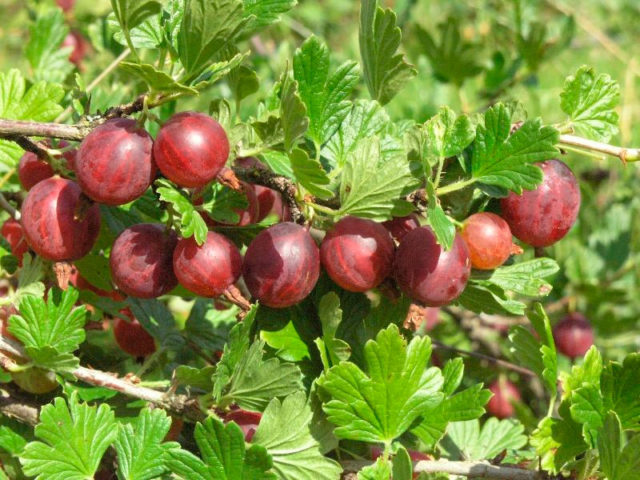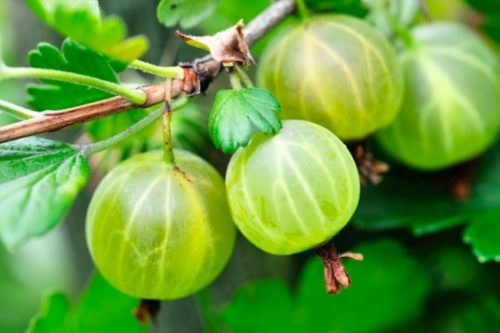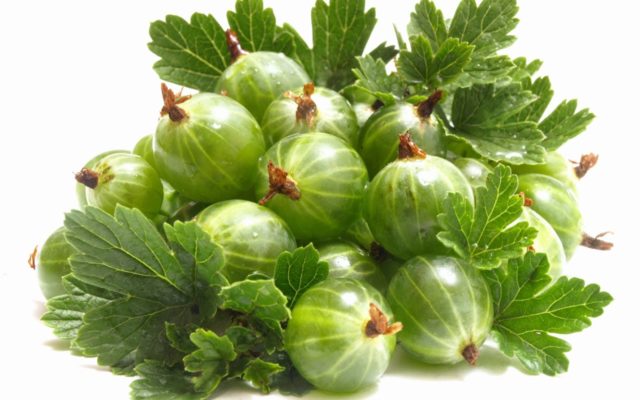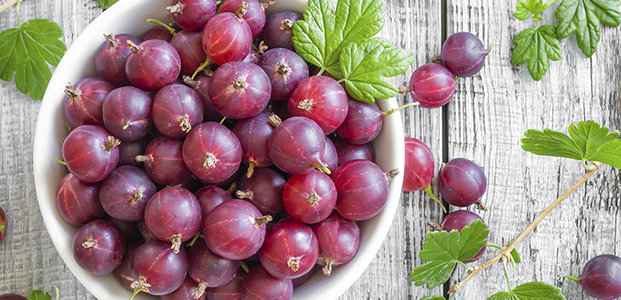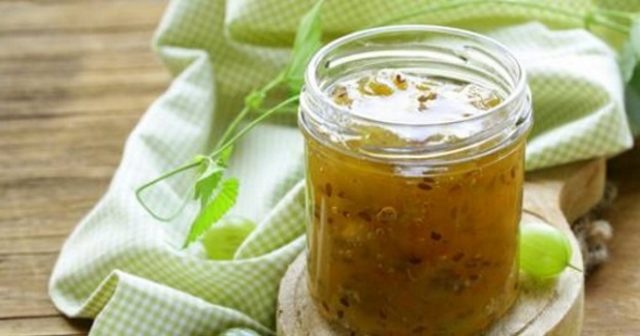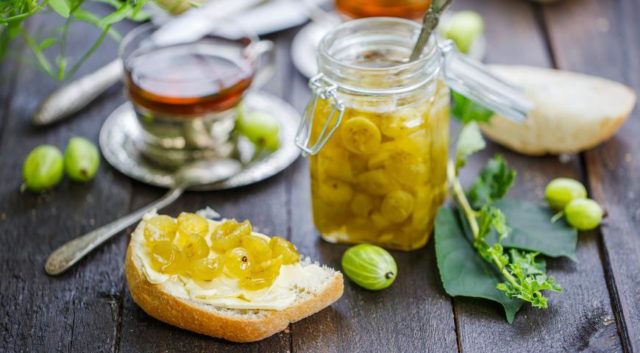Content
The health benefits and harms of gooseberries continue to be actively studied by nutrition and health professionals. The plant belongs to the Gooseberry family, the Currant genus. This is a shrub with large fruits: from 12 to 40 mm in length and weighing up to 60 g. Currently, more than 1.5 thousand varieties of plants of a cultural or wild-growing group have been discovered, each of which has its own unique decorative and taste qualities. The flavor of the berries can vary from sour to sweet, the same rich variety and color range of fruits: from pale green, emerald and yellow to bright orange or purple. Gooseberry grows in many countries, which include Europe, Africa, America, Asia, the Caucasus, Ukraine and Russia.
Despite the wide distribution of berries, not everyone knows what the benefits and harms of gooseberries actually are for the human body, and what effect they have on human health.
The composition and value of gooseberry berries
Gooseberry berries contain 84 - 90% water, carbohydrates, fiber, starch, pectin substances, oligo- and monosaccharides. In addition, the fruits are rich in organic acids, of which 37 - 54% is ascorbic. The composition is also rich in tannins, carotenoids, catechins and nitrogen-containing substances. The product contains salts of potassium, calcium, sodium and magnesium.
The concentration of certain elements in the composition of the berry is significantly influenced by the gooseberry variety, the place of its growth, the degree of ripeness, as well as the conditions for growing the shrub.
Vitamin content
The benefits of gooseberry berries for human health are due to the rich content of nutrients in their composition, among which vitamins occupy one of the most important positions. The berries contain:
- vitamins of group C (up to 60% of the daily requirement of the body);
- B vitamins;
- provitamin A (up to 15%).
The dark colored gooseberry contains vitamin P and pectin substances, which contribute to the active removal of heavy metal salts from the body.
This berry is also valuable for mineral components such as potassium, iodine, sodium, calcium, iron, manganese, cobalt, zinc, phosphorus and copper. Of the organic acids in gooseberries, you can find malic and citric, as well as folic acid.
The most beneficial are nitrogenous and tannins in the berry, as well as theanine, which has hemostatic properties. Due to the high content of pectin, the use of gooseberries helps to eliminate heavy salts from the body, while leucoanthocyanin and anthocyanin help to get rid of accumulated toxins and toxins.
Gooseberry calories
The energy value of 100 g of gooseberries is only 45 kcal. BJU: 12 g carbohydrates, 0.7 g protein, 0.3 g fat. Berries also contain 15% sugars (sucrose, glucose, fructose).
An equally important factor is the glycemic index of the food, which helps determine if the blood sugar level rises when consumed. In gooseberries, this indicator is low, equal to 25 units, which means that sugars are evenly transformed into energy, which the body quickly uses. Low calorie content and glycemic index allows people with diabetes mellitus to eat the berry, as well as when losing weight.
Useful properties of gooseberries
Gooseberries are rich in hypotensive and capillary-strengthening substances, as well as anti-sclerotic P-active compounds, which is why the product is of particular benefit in the treatment and prevention of hypertension, atherosclerosis and other diseases of the cardiovascular system. Gooseberry infusion has the ability to remove excess cholesterol from the body, and thanks to the serotonin in the composition of the drug, it has an antitumor effect.
You can use gooseberries both fresh and as decoctions in the presence of hypovitaminosis, lack of iron, copper or phosphorus in the body, to normalize metabolism, in the treatment of chronic constipation, gastroenterocolitis, dropsy, and also to stop bleeding.
Gooseberry weakens or strengthens
Gooseberry is rich in plant fiber, which in a soluble form contributes to the beneficial nutrition of the intestinal microflora, and the insoluble form tends to enhance peristalsis and increase the volume of feces. Because of this, the berry is indicated for use in the presence of constipation, as well as for their prevention.
Which gooseberry is healthier
Gooseberries can be consumed both as fresh berries and in the form of various cooking options (for example, jam). However, it is worth remembering: heat treatment can "block" most of the useful properties of the product. Therefore, using gooseberries for medicinal purposes, it is better to give preference to fresh berries. This will help stimulate the metabolic process in the body and normalize the state of health.
The benefits of gooseberries for the body
Due to the presence in the composition of many substances necessary for the body, gooseberries have many beneficial properties for health, which not every lover of this berry knows about.
The benefits of gooseberries for men
Gooseberry is a useful product for the male body due to its rich composition of vitamins from A to PP, as well as beta-carotene. In combination with trace elements, useful substances stimulate the acceleration of the metabolic process and improve blood flow, which is extremely important in sports training.
Eating gooseberries helps to build muscle and tone the male body as a whole, since the product helps to activate most of its systems and balance the level of hormones in the body. In addition, the berry helps to strengthen the nervous system and prevent stress.
Experts recommend using the berry for men with problems in the work of the cardiovascular system: gooseberries help reduce the risk of stroke, which is one of the leading causes of death among males.
You can find out more information about the benefits and dangers of gooseberries for human health, as well as about the valuable properties of the berries from the video:
Useful properties and contraindications of gooseberry for women
It is difficult not to appreciate the benefits of gooseberries for women: in addition to saturating the body with a number of essential vitamins, the berry has a beneficial effect on most of its systems, including hormonal, which helps to successfully use the product with benefits for women's health.
Can gooseberries be pregnant
The benefits of eating gooseberry fruits during pregnancy are manifested in strengthening the walls of blood vessels and the immune system, normalizing metabolism, as well as improving digestive processes. Due to the participation of folic acid, the fetal neural tube is formed and the risk of miscarriage is significantly reduced, and the effect of pectin is manifested in the elimination of toxins and heavy metal salts. Gooseberry has a low calorie content, and therefore it can be introduced into the diet of fasting days in order to reduce weight.
Quite often, gestation can be accompanied by anemia, due to which the level of hemoglobin drops significantly even in the body of a healthy woman. The iron contained in the product can help with such conditions in combination therapy. Calcium, which is rich in gooseberries, will help replenish the reserves of the element for the skeletal system in the body of the expectant mother and baby.
The beneficial properties of gooseberries are also manifested in eliminating the symptoms of toxicosis, preventing nausea and vomiting, and the sour taste of berries stimulates the appetite.
The benefits of eating gooseberries by pregnant women lies in the normalization of kidney function, which helps relieve a serious load from these organs in a special period of a woman's life. The use of berries stimulates the elimination of excess fluid from the body, which, in turn, affects the reduction of leg swelling. The inclusion of the product in the diet of the expectant mother will contribute to the treatment of pyelonephritis and cystitis.
The useful property of gooseberries to restore bowel function is also of great importance in late pregnancy, when the fetus begins to press on the woman's abdominal cavity, including the intestinal area, which often causes severe constipation.
Can gooseberries be breastfed?
The period of breastfeeding is a rather important stage in the development of a newborn, so a woman should be especially careful about her diet. The gooseberry contains valuable vitamins and minerals, the restoration of which in a woman's body is important during feeding.
Therefore, the gradual introduction of gooseberries into the diet will help improve the quality of breast milk, replenish the energy reserves of a woman's body depleted by childbirth, and also:
- strengthen teeth and gums;
- accelerate metabolism, which is extremely important when restoring a figure after childbirth;
- normalize the digestive tract of both mother and baby, prevent colic.
At what age can gooseberries be used for children?
Gooseberry is rarely capable of causing allergic reactions, but the organic acids it contains can provoke digestive system disorders. Therefore, the berry should be introduced into the baby's diet no earlier than he reaches 12 months.
At an early stage (1 - 1.5 years), the child can use gooseberries in the form of juices, since the pulp of the berries contains bones that cannot be absorbed by the child's body. Experts advise to dilute the drink with water in a 1: 2 ratio so that the components in the gooseberry composition do not irritate the child's digestive system. It is better to start with minimal portions (a few drops), gradually increasing the dose to 50 - 60 ml to reach the age of 1.5 years.
After 2 years, you can begin to accustom your baby to whole gooseberry fruits. They are added to desserts, casseroles, puddings, jellies, and milk-based cereals. Another option is a fruit salad with gooseberries.
Healing properties of gooseberries: berries, leaves, twigs
Few people know that both the gooseberry fruits and the leaves and twigs of the plant carry useful properties. That is why the berry is actively used in the field of traditional medicine in the treatment of various diseases.
Benefits of gooseberries for diabetes
The usefulness of gooseberries is invaluable in type 1 and 2 diabetes mellitus.
At the initial stages of the development of the disease, the use of fruits can help self-stabilize the patient's condition and save him from using special medications.
The beneficial properties of gooseberries in diabetes are due to the composition of the berries: in addition to problems with the concentration of insulin, the body becomes deficient in chromium, which entails poor assimilation of vitamins consumed with food. Gooseberries contain enough chromium to keep the body in good shape.
Doctors note the particular importance of chromium in diabetes mellitus: according to experts, the element has a beneficial effect on the pancreas, which takes a big blow in case of illness.
With menopause and menstruation
The benefits of gooseberries are also relevant for menstrual irregularities in the female body. Regular consumption of berries will help regulate menstruation, as well as normalize the abundance of secretions. Due to the presence of ascorbic acid in the gooseberry, the product significantly raises the level of hemoglobin in the blood, which tends to fall during the menstrual period. In addition, the use of the fetus contributes to the normalization of hormonal levels during menopause.
With depression and neurosis
The presence of B vitamins in the berries activates the functioning of the brain and nervous system, which helps to improve memory, cognitive functions, normalize mood and general psychological state, and get rid of depressive and suicidal thoughts.
With kidney disease
Gooseberry fruits are known for their diuretic and choleretic properties, which is why the infusion of berries is recommended to be taken for the prevention and treatment of kidney, urinary and gall bladder diseases.
The benefits and harms of gooseberry jam
You can eat gooseberries both fresh and in the form of jam, which is well suited as a preservation for the winter. The main disadvantage of this sweetness is the process of thermal processing of berries, due to which the gooseberry can lose most of its beneficial properties. However, there is a variant of raw (or cold) jam, the preparation of which retains all the benefits of the berries.
After a short heat treatment, 80% of vitamins C and P are retained in gooseberries, which have a beneficial effect on the functioning of the heart and liver, as well as on blood vessels. Due to the preservation of most vitamins and useful properties in raw jam, it is especially recommended to use it in spring, when the risk of vitamin deficiency increases.
Despite the excellent taste and benefits, it is highly discouraged to use such jam for obese people, since the product contains "fast carbohydrates" that contribute to weight gain. In addition, it is better to abstain from sweets for people with gastritis, high acidity, allergies and diabetes.
Useful properties of gooseberry leaves
In addition to fruits, gooseberry leaves also have significant benefits. It is worth noting that the concentration of certain components in their composition may vary, depending on the type of plant. The bush leaves contain:
- folic acid;
- malic and citric acids;
- vitamin C;
- retinol;
- vitamin E;
- tryptophan;
- a nicotinic acid;
- B vitamins;
- a group of antioxidants;
- tannins and flavonoids.
Due to the presence in the composition of such an accumulation of useful elements, gooseberry leaves in a fresh and dried form are actively used in folk medicine.
However, despite all the beneficial properties of gooseberry leaves, it is important to familiarize yourself with all contraindications and possible side effects before using them.
The use of gooseberry leaves in folk medicine has many options: decoctions, tinctures or compresses that can be used for various purposes:
- treatment of anemia: due to the presence of nutrients and trace elements in the leaves, which stimulate blood circulation and increase metabolism;
- improving the functioning of the immune system: for this, it is recommended to take tea from the leaves of the plant in winter, when the risk of flu and colds increases especially;
- high-quality cleaning of the body: malic acid in the leaves helps to remove accumulated toxins and decay products from the body;
- weight loss and normalization of the digestive tract;
- reducing the risk of developing atherosclerosis;
- improvement of the central nervous system and activation of the work of brain cells;
- treatment of infectious diseases: in addition to ascorbic acid, tannins in the composition of the product also contribute to this;
- prevention of myocardial infarction;
- removal of inflammation in the oral cavity;
- treatment of gynecological diseases;
- improving skin condition, removing traces of fatigue.
In the treatment of certain diseases, teas, decoctions and tinctures from the leaves have the most effective effect on the body. Each product has its own cooking characteristics:
- Tea. For its preparation use 2 tsp. dried gooseberry leaves, 2 tsp. black tea and 1 slice of lemon. All ingredients must be mixed and placed in the teapot. After that, pour boiling water over the mixture and leave for at least 5 minutes. Add mint, cinnamon, or dried gooseberries if desired.
- Broth. You need to take 2 tbsp. l. dry and 4 tbsp. l. fresh leaves of the plant and pour them 800 ml of boiled water, then cook over low heat for 8 minutes. The resulting drink should be cooled and then carefully filtered.
- Infusion. For its preparation, it is best to use a thermos, into which you need to pour 2 tbsp. l. dry gooseberry leaves and pour 400 ml of boiled water. The composition should be infused for 30 - 60 minutes, after which it should be cooled a little and filtered.
Gooseberry medicines should be used when treating:
- Hernia of the esophagus. To alleviate the condition, it is enough to take ½ glass of broth 3-4 times a day, regardless of food intake. The course of treatment is 10 days, after which it is necessary to take a break for a week and, if necessary, continue treatment.
- Tuberculosis. To do this, take 250 ml of gooseberry infusion during the day. The course lasts 30 days, after which you should take a break for 2 months.
- Arthritis and ligament injuries. To do this, you can use compresses broth. Boil 100 g of dry gooseberry leaves in 200 ml of water for 30 minutes, then soak gauze swabs with broth and apply them to the inflamed area.
- Gynecological diseases. In case of inflammatory processes, douching is carried out with a decoction from the leaves of the plant. If during the procedure there is a burning sensation and discomfort, this is a signal of individual plant intolerance, in which case the procedure must be stopped. The course of treatment is 7 days.
- SARS and colds. With this disease, it is recommended to take tea from the leaves with the addition of honey. Such a remedy is suitable for both the elderly and younger preschool children.
- Inflammatory and infectious diseases of the urinary system. To do this, you need to take a tincture of leaves of 150 g 5 - 6 times a day. If desired, you can sweeten the drink with honey or sugar.
- Inflammatory processes of the oral cavity. It is necessary to rinse your mouth with a decoction of the leaves 2-3 times a day.
- Insomnia and neuroses, to calm the nerves. To prepare the product, you will need 1 tsp. rowan and strawberry leaves, gooseberry leaves and 3 tsp. burdock. The collection is poured into 2 tbsp. boiled water and insist for 30 minutes.It is necessary to take the product 200 ml at a time, if desired, you can add jam or honey.
- Symptoms of fatigue, loss of strength and rapid fatigue. It is necessary to brew the foliage of the gooseberry, raspberry and currant in equal amounts. Once a day, you should take 1 tbsp. funds throughout the month. The infusion is also recommended to drink in spring and autumn to prevent vitamin deficiency.
- Obesity. For weight loss, take a decoction based on the leaves and fruits of the plant. Such a remedy has powerful diuretic and laxative properties, accelerates the metabolism in the body. It is advised to take it during the week of 100 g in 5 doses.
The benefits and harms of gooseberry twigs
Shrub twigs, which are also used to make teas, also have useful medicinal properties. When properly prepared, such a drink has significant benefits for blood vessels, helps to accelerate metabolism, increase the body's immune forces, and also has a diuretic property. Often, the remedy is prescribed for the treatment of rheumatism.
To make tea, you need to take several sprigs of gooseberries and boil for 15 minutes, then let the drink infuse (it is best to leave the tea overnight). Then the drink must be filtered and reheated, without bringing it to a boil. It is necessary to take the remedy 2 - 3 times a day before meals.
Gooseberry branches lend themselves to brewing in a second circle, and raw young trees can be brewed directly from the buds.
Considering all the medicinal properties of gooseberry fruits, leaves and branches, it is important to familiarize yourself with possible contraindications before using them.
Gooseberry application
For the use of gooseberries in the field of cooking, they take both fresh berries and thermally processed ones.
The production of jam with a characteristic emerald color, as well as jams, marmalade and jelly, is in great demand. The berries of the plant are used to make drinks (jelly, compote, etc.) or desserts (ice cream, pastries, cakes or yogurt). Due to the sour taste of the fruit, gooseberries also add spice to various sauces for dressing meat.
In cosmetology
As noted above, the sour taste of gooseberries is due to their rich content of vitamin C, which is invaluable for the regeneration of skin cells. Ascorbic acid accelerates chemical reactions, due to which the epidermis is cleansed of all toxins, renewed and oxygenated
However, the beneficial properties of other organic acids present in the berry make it possible to exert a complex effect on the skin, penetrating into the deeper layer of the epidermis, cleansing it and dissolving harmful substances.
Tacretinol promotes the repair of damaged cells, folic acid molecules protect against photoaging, and potassium promotes hydration.
The use of gooseberry face masks makes the skin smoother, softer and more delicate to the touch, relieves inflammation and lightens age spots over time. The skin becomes firm and healthy.
There are many variations of gooseberry masks, each of which brings unique benefits to the skin, cleansing and whitening it:
- Classic cleansing. It is necessary to knead 1 tbsp. l. berries in gruel and apply on face for 7 - 10 minutes, then rinse with warm water.
- Mask with glycerin. A little gooseberry juice is mixed with glycerin and applied to the skin for 5 to 10 minutes.
- Mask with wine to eliminate acne. You need to take 2 - 3 tsp. white wine and add some crushed berries. Let the mixture brew for 10 - 15 minutes, and then gently apply it on the face for 5 - 10 minutes.
- Moisturizing. Add a few drops of olive oil to the berry gruel and spread over the skin for 7 - 10 minutes. Place a towel under your head.
- Mask with milk. 2 - 3 tbsp. l.milk is heated over a fire, and then a little pounded gooseberry is added. You can also use a few drops of olive or linseed oil. Let the resulting mixture brew for 10 - 15 minutes.
- A facial scrub is a great option for cleansing your skin at home. It will require some oatmeal, which must be mixed with 2 tbsp. l. gooseberries and add 1 tsp. Sahara. The product can be stored in the refrigerator for up to 2 days.
- Acne mask. It uses blue clay, known for its beneficial cleansing properties. You need to mix in 1 tsp. clay and gruel from berries and apply the mask on the face until it dries. If the mixture is too thick, you can add a little warm water or olive oil.
- Nutritious. Add sour cream or homemade yogurt to the berry gruel. For its preparation, flour is also used (it is better to use chickpea, pea or wheat).
- Yolk mask. The yolk of one egg is mixed with 1 tsp. grated berries and applied to the skin for 7 - 10 minutes.
When losing weight
Gooseberries will also benefit people looking to shed a few extra pounds. Eating 700 grams of berries per day, you can significantly speed up your metabolism and provoke fat burning in the body. At the same time, it is important to control the diet and try to exclude fast carbohydrates from it.
There is also a more thorough approach to weight loss: the gooseberry diet. It does not apply to mono diets, so other foods can be added to the diet.
To avoid harm to the body, a gooseberry diet is categorically contraindicated for people with a berry allergy.
There are several options for conducting a diet, among which everyone can find the most optimal one. The gooseberry diet is based on a standard pattern:
- The first day includes three times the use of berries of 450 - 500 g. In the morning, fruit reception can be supplemented with a slice of bread with cheese, at lunchtime - cottage cheese, and for dinner, drink two glasses of kefir.
- On the second day, the volume of the berries is increased to 600 g. For breakfast, it is recommended to eat a plate of oatmeal and drink a glass of gooseberry juice (300 g of the morning portion of berries). For lunch, in addition to berries, you can include chicken breast, and finish the last meal with cottage cheese.
- The rest of the days you need to alternate this sequence. It is also important to consider that the berry diet is best supplemented with physical activity and drinking plenty of water, which also helps speed up the metabolic process in the body.
With proper adherence to the diet for a specified period, you can get rid of 2 to 4 kg. The standard regimen provides gradual weight loss without harm to the digestive system and the body as a whole.
Limitations and contraindications
Despite all the beneficial properties of the fruit, there are several contraindications to the use of gooseberries:
- the berry is not recommended to be consumed in the presence of gastric ulcer;
- with an allergic reaction;
- with inflammatory diseases of the gastrointestinal tract.
Conclusion
The health benefits and harms of gooseberries continue to be actively studied by experts around the world. Today, many useful properties have been discovered that berries give to the human body: value for the treatment and prevention of various diseases, for weight loss, during pregnancy, etc. The availability of gooseberries allows you to use it in many areas (from cooking to cosmetology), and the rich composition of the berry has a beneficial effect on many body systems. Before eating berries, you should familiarize yourself with possible contraindications in order to avoid negative consequences.
